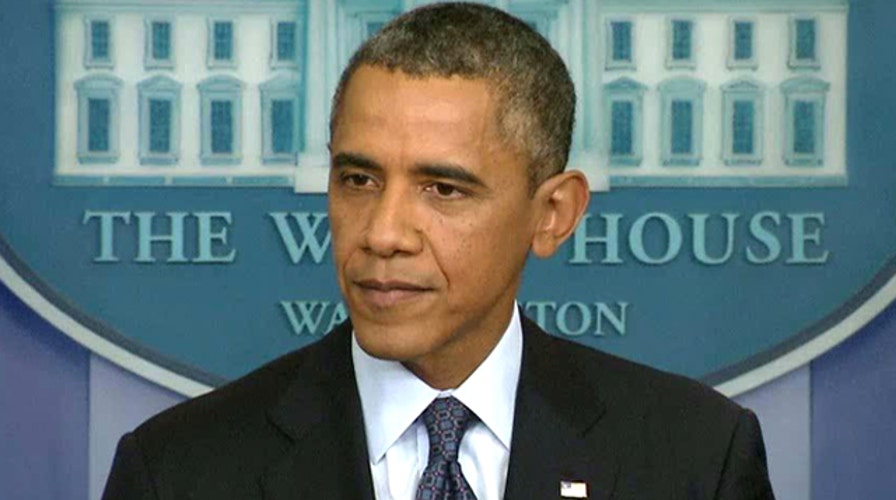Obama: Raising debt ceiling 'does not increase our debt'
President addresses standstill in Washington
If actions speak louder than words, then the rhetoric coming from Washington is making it harder to believe lawmakers can act on anything that might end the ongoing fiscal crisis -- or even point themselves in the same direction.
All sides are offering a different solution. Cracks are even beginning to show in the Democrats' approach. President Obama told reporters on Tuesday he's "absolutely" willing to accept a short-term measure to fund the government and raise the debt ceiling, and negotiate with Republicans after that.
But hours later, Senate Democratic Leader Harry Reid introduced a bill that would approve a debt ceiling increase through the end of next year.
Meanwhile, House Republicans passed a measure to create a bipartisan "super committee" to negotiate the budget and debt-ceiling impasse. Yet the idea was privately panned by Republican lawmakers and publicly ridiculed by Democrats as "stupid." A "super committee" was last created to hash out a deficit-cutting package -- but the members failed, triggering the so-called "sequester" which cut spending across the board.
It's unclear which, if any, of these options all sides might be able to agree on. Perhaps sensing the hardening stalemate, President Obama is expected to invite all four congressional caucuses to the White House later this week.
House Democrats will be invited to a meeting at 4:30 p.m. ET, Fox News has learned.
Senate Democrats, as well as House and Senate Republicans, are expected to be invited later on.
The back and forth came as the financial world flashed unmistakable signs that it feared Washington's twin battles could hurt the economy.
The stock market declined again Tuesday, with the Dow Jones industrial average dropping nearly 160 points, or 1.1 percent. The International Monetary Fund trimmed its global and U.S. growth forecasts through 2014, warning that failure to renew the debt limit would raise interest rates and potentially shove the American economy back into recession.
The Obama administration has said that unless Congress acts, it expects to have an estimated $30 billion in cash left by Oct. 17. That is pocket change for a government that can spend tens of billions more than that on busy days, and $3.6 trillion a year.
Hitting that date without congressional action would risk an unprecedented federal default that would wound the economy and deal lasting harm to the government's ability to borrow money, many economists warn. Some Republicans have expressed doubt that the damage would be as severe.
On Tuesday, Senate Democrats introduced legislation that would avoid those scenarios by letting the government borrow money through Dec. 31, 2014. It contained no spending cuts or other deficit-cutting steps many Republicans seek.
The bill's fate was uncertain, since the 54 votes Democrats can usually muster are short of the 60 votes they would need to overcome a conservative filibuster aimed at derailing the bill. An initial test vote seemed likely by Saturday.
Tuesday's economic tremors did little to alter each side's demands.
Obama said he would negotiate, but added: "I'm not going to do it until the more extreme parts of the Republican Party stop forcing John Boehner to issue threats about our economy. We can't make extortion routine as part of our democracy."
Two hours later, Boehner stood firm.
"What the president said today was if there's unconditional surrender by Republicans, he'll sit down and talk to us," Boehner said. "That's not the way our government works."
Meanwhile, Rep. Paul Ryan, Republican chairman of the House Budget Committee and the party's candidate for vice president, proposed in a Wall Street Journal op-ed published Wednesday that the stalemate be resolved by having both sides agree to "common sense reforms of the country's entitlement programs and tax code."
Ryan suggested Obama was being disingenuous about refusing to discuss policy issues as part of the process of getting the debt limit increased and getting passage of a stopgap spending bill to allow the government to resume normal operations.
He said that "many presidents have negotiated on the debt ceiling -- including him."
In the House, Republicans were continuing their tactic of pushing through narrowly targeted bills -- over Democratic objections -- that would restart popular parts of the government.
On Wednesday, they planned votes on a measure financing death benefits to families of fallen U.S. troops. Blaming the shutdown, the Pentagon has halted the $100,000 payments, usually made within three days of a death, a stoppage Boehner called "disgraceful."
The Associated Press contributed to this report.





